cti4sw
Bronze Member
- Joined
- Jul 2, 2012
- Messages
- 1,555
- Reaction score
- 919
- Golden Thread
- 1
- Location
- Pennsylvania
- 🥇 Banner finds
- 1
- Detector(s) used
- Minelab Equinox 600, Garrett AT Pro, Pro Pointer
- Primary Interest:
- Relic Hunting
Well, I call it fishing. More or less I was carrying fishing gear, but I just couldn't find a place on the creek with any fish in it. 
I won't be complaining, though.

Since searching the water for fish was unproductive, I began searching the dry spots for these tiny red and brown toads that happen to make good live bait when I spotted this oddly shaped rock. There was a huge chance I was seeing a natural formation, but what the hell, I picked it up anyway, intending to post it here for y'all to mull over. Never seemed to have the time, so it sat on my dining room table until today.
Yesterday, I went to an encampment reenactment hosted by a local history society my group associates with. A guy there had a remarkable display of Revolutionary War military buttons on display - some he found while metal detecting - so of course we got to talking. He told me he is a curator at an Indian museum in Allentown, so I asked if I could send him pictures of a few items I wasn't sure about, and he said yes. Well, since my travels today would have taken me past the reenactment, I decided to just bring some stuff to show him.
Today, he was displaying a collection of arrowheads. First, he confirmed that my bone awl is post-contact, colonial-era American Indian, and it's a loom needle rather than an awl. He mentioned that dual-thread needles are a little more uncommon than single-thread.
Then I showed him the rock. After a close inspection, he identified it as a primitive shale axe head, with some workmanship, but its time in the creek has taken its toll. He also noted a fletching notch that has seen significant use. His estimate was about 10,000 years old, possibly used up until European contact. I was ecstatic; this is only my second Indian artifact find, as I didn't think I really had the eye for it.
It measures 6-1/16" from tip to tip and about 2-3/4" at its widest point, maybe 1" thick at the shaft notches, with a weight of 7.3 oz.
Side profiles
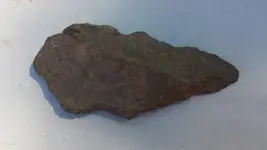
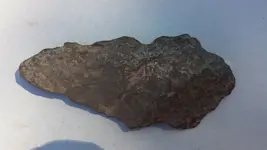
Pointed edges
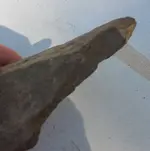
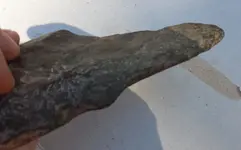
Fletching notch
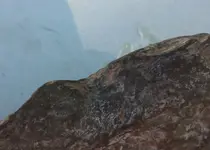
Short head profile
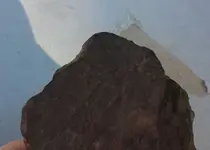
Since it was found about a half mile from the hosting history society's farmstead museum, I will be fashioning a handle for it and donating it to their museum upon completion to complement the blacksmith's hammer and an old Bible I donated this summer.
EDIT: I'll also mention that he looked through my button collection and told me two of my previously-unknown buttons are Rev. War militia buttons, one a Hessian-style and the other some sort of silver-plated uniform cuff button
I won't be complaining, though.


Since searching the water for fish was unproductive, I began searching the dry spots for these tiny red and brown toads that happen to make good live bait when I spotted this oddly shaped rock. There was a huge chance I was seeing a natural formation, but what the hell, I picked it up anyway, intending to post it here for y'all to mull over. Never seemed to have the time, so it sat on my dining room table until today.
Yesterday, I went to an encampment reenactment hosted by a local history society my group associates with. A guy there had a remarkable display of Revolutionary War military buttons on display - some he found while metal detecting - so of course we got to talking. He told me he is a curator at an Indian museum in Allentown, so I asked if I could send him pictures of a few items I wasn't sure about, and he said yes. Well, since my travels today would have taken me past the reenactment, I decided to just bring some stuff to show him.
Today, he was displaying a collection of arrowheads. First, he confirmed that my bone awl is post-contact, colonial-era American Indian, and it's a loom needle rather than an awl. He mentioned that dual-thread needles are a little more uncommon than single-thread.
Then I showed him the rock. After a close inspection, he identified it as a primitive shale axe head, with some workmanship, but its time in the creek has taken its toll. He also noted a fletching notch that has seen significant use. His estimate was about 10,000 years old, possibly used up until European contact. I was ecstatic; this is only my second Indian artifact find, as I didn't think I really had the eye for it.
It measures 6-1/16" from tip to tip and about 2-3/4" at its widest point, maybe 1" thick at the shaft notches, with a weight of 7.3 oz.
Side profiles


Pointed edges


Fletching notch

Short head profile

Since it was found about a half mile from the hosting history society's farmstead museum, I will be fashioning a handle for it and donating it to their museum upon completion to complement the blacksmith's hammer and an old Bible I donated this summer.
EDIT: I'll also mention that he looked through my button collection and told me two of my previously-unknown buttons are Rev. War militia buttons, one a Hessian-style and the other some sort of silver-plated uniform cuff button

Last edited:
Upvote
6




